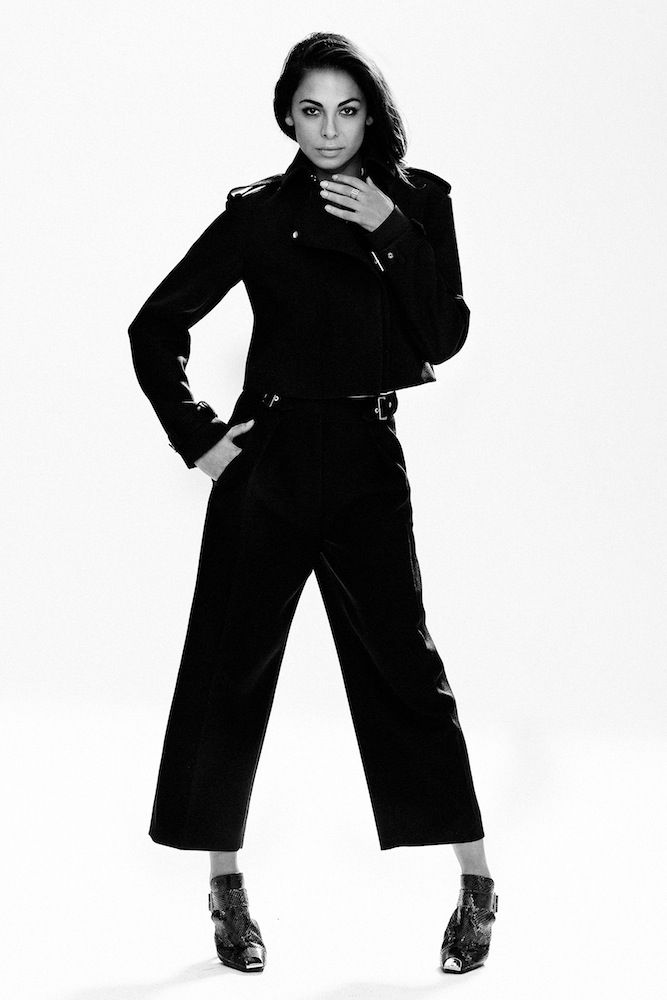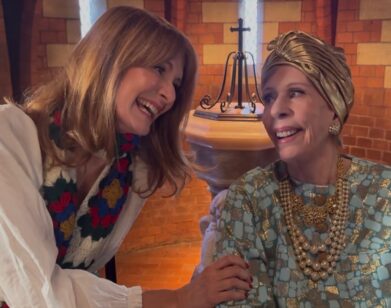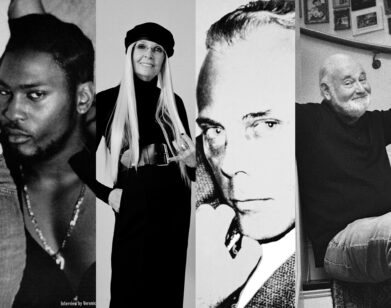The Multi-Hyphenate Actress
ABOVE: MORAN ATIAS AT MILK STUDIOS IN L.A., DECEMBER 2013. PHOTOS: BRIAN HIGBEE. STYLING: ANITA PATRICKSON. STYLING ASSISTANT: EMMA RUBENSTEIN. HAIR: MICHAEL LONG. MAKEUP: SAGE MAITRI.
In the age of the multi-hyphenate talent, one can wonder if it’s possible for a celebrity to be a little too talented. But for Moran Atias, that’s not the case. The Israeli-born actress, writer, and producer, who says she’s always happy to be “in study mode,” be it for a character, a script, or a television pilot, merges her life and work into an interconnected space of ever-evolving creative exploration.
Originally intending to study psychology in Israel, Atias left her home country to become a model, and ended up in Italy as a TV personality and radio host. At the urging of a close friend (Dolce & Gabbana’s Domenico Dolce), she gave acting a shot, which led to working with giallo maestro Dario Argento. Her career became transcontinental with turns on the Israeli show Allenby St. and on Paul Haggis’ Crash TV series. In what has become an ongoing collaboration, Atias teamed up with Haggis again for his 2010 thriller, The Next Three Days.
At this stage in her career, and now based Stateside, it seems as if Atias has mastered how to nurture her creative impulses in Hollywood. She’s currently working on a screenplay set in Tel Aviv, Gaza, and North Carolina, and will star as an Albanian gypsy in Paul Haggis’ latest film, the multi-city, multi-narrative love story, Third Person, with Adrien Brody, James Franco, Mila Kunis, Liam Neeson, Olivia Wilde, and Kim Basinger. Atias also pitched and co-produced Third Person, which is due out this spring. Next summer, she’ll star as the conflicted first lady of a Middle Eastern dictator in the latest project from Homeland producers Gideon Raff and Howard Gordon, Tyrant, on FX.
We recently caught up with Atias by phone while she was at home in LA.
COLLEEN KELSEY: I was checking out your Twitter and I saw you were just at Art Basel Miami. How was it?
MORAN ATIAS: It was wonderful. I just needed to escape a little bit. My script—I’m writing something new—it’s just swallowing me. So it was a really beautiful, great getaway to see some art.
KELSEY: What are you working on? Are you allowed to talk about it?
ATIAS: I’m developing a new feature film. It’s a quite a massive project. It’s a multi-narrative storyline, which is a big passion of mine, [laughs] but it definitely requires much more work than just one narrative story.
KELSEY: Do you remember when you decided that you wanted to work in film, whether it was acting or writing? I know now you’re producing as well.
ATIAS: It wasn’t a childhood dream or an interest. I always liked creativity, whether it was to draw or sew—any creative assignment I was getting from school, or just on my own. I love people and behaviors, and I’m interested and fascinated by why we do what we do. And I wanted to be a therapist, to be honest. Maybe this combines the two worlds, in a not super-linear way, but [it] definitely feeds both my two passions. And when I was working in Italy, a friend suggested that I quit whatever I was doing at the time and act because he thought I’m wasting my time in cheesy Italian television. But I was 20 years old and I loved what I was doing—just fun. And when he suggested that, I said, “You know, it’s an art, it’s a craft. I want to explore it first and maybe take a workshop or a seminar and understand if I’m capable and interested.” And I fell in love with that, and that changed my life.
KELSEY: What brought you to Italy from your home in Israel?
ATIAS: My dream was to study psychology in Israel. It’s a long journey—it’s seven years of study. I left Israel to work as a model, to just make money—I didn’t care if I was doing an ad for toilet paper or diapers, I just really wanted to allow myself to go to school, to go to university without waitressing, because when I’m in a school environment I just really like to study and have the best grades and learn as much as I can. So, I said to myself, I’ll be for a year, nine months—which is the time of military service in Israel—around the world just to make money and come back to Israel and study. But, once I got to Italy—change of plans. I met this agent that really believed in me and saw that I could do other things than modeling. We, kind of, artistically grew up together. I was like, “But I don’t even speak Italian. How do you want me to do anything here?” And she was like, “Oh, please. You’re Israeli, you’ll learn in three months.” And I did. I started speaking Italian within three months and just fell in love with the language, and created a career for myself. I started hosting big variety shows and had my own radio show. And then after years of doing that, like I said, Domenico Dolce was the guy that was like, “What the fuck are you doing in TV?”
KELSEY: Was there a specific film or a turning point that cemented your thought that you could do this?
ATIAS: My first film [Gas, 2005]—a challenging role and completely different from the persona that was created in Italy. I was this super energetic, vibrant, happy, volumed hair, fitted dresses, the whole Italian va-va-voom thing. And the role was a girl that was really provoking society with being unnecessarily violent—just trying to see what people’s limits are. It’s a really dark tunnel to get to being nasty, being full of hate. When people hate there’s a big sadness and rage within them, so it was interesting to go that dark with my first experience. Whenever there’s a role that scares me, I get panicked and nervous. I know that greatness might come because I’m going to get out of my own element and comfort zone.
KELSEY: What kind of role would you like to take on that you haven’t already?
ATIAS: I feel like I’m just starting. I like complex characters. I’ve been very, very lucky to portray, in these past three years, characters that are strong and fragile at the same time. It’s those characters that I’m looking for. In the last year and half I played three different religions, and that allowed me to educate myself so much. I played a Jewish Orthodox girl stripping in a club in Tel Aviv, based on a true story. Then, in Third Person, I’m playing an Albanian gypsy who’s super religious, but, at the same time, she’s a con artist and that’s how she survives. And in Tyrant, I’m playing a first lady that is dominated by the Muslim country and she’s Muslim.
You’re staying in the same place but you’re departing with your mind and soul and educating yourself until you can really understand such huge worlds. Those are the roles that keep loyal to [the] authenticity of what people are, and not caricatures. It’s something that requires me to prepare for three, four months. I love the process of it, rather than, “Okay, I’m ready, I’m set with the wardrobe that somebody else chose for me.” I love to pick those clothes myself, find the makeup, find the right hair, the walk. People speak in different rhythms, too. I just love to be in that study mood.
KELSEY: How does it feel when you exit a character? You’re leaving someone that you’ve been so close to behind.
ATIAS: Some characters are more special to me than others. For example, the character I played in this show in Israel, the show is called Allenby St., and the girl had an incestuous relationship with her brother since she was six years old. You know, that opened a whole new world for me to investigate, incest and sexual abuse. I was exposed to so many girls that were sexually abused within their families, by strangers. And, now, I’m in Tyrant. I read so many books about women in that environment, growing up in a hardcore Muslim environment, so deprived from certain rights, human rights. I have a different sensitivity about it. I feel that I have a certain responsibility. I feel like I’m responsible to honor the people that have been through certain things in life.
KELSEY: Let’s talk about Tyrant and your role. How did you first get the script and what attracted you to the story?
ATIAS: I’ve been a huge fan of Gideon Raff since I saw Prisoners of War, and then I approached him because I wanted him to help me write my movie, because it’s set in three different countries and one of the main events of my movie is the kidnapping of a soldier. When I met him, I fell in love with his sensitivity. The way he writes is so profound and to the core. It’s just, like, god, I feel it my gut, I feel it in my belly, in my inner organs. Years later I got the script for Tyrant. I got really lucky to actually portray, for me, the most interesting character, because she’s set in two worlds. She’s groomed to be first lady and marry this man who is a pretty awful human being—on the page he’s awful. But, then again, it’s interesting: why would I be with somebody like that? That reflects on who I am too. If you chose to be with an abusive man, a powerful, abusive man, it reflects something about who you are and what you want for yourself. Being a woman in that environment is truly an interesting position.
KELSEY: And now you’re creating characters, as well, through writing. You also co-produced The Third Person with Paul Haggis. You’ve worked together before. How has your collaboration evolved?
ATIAS: I came to him about five years ago now and I pitched him ideas. I mean, some were awful. [both laugh] And then I was like, Okay, what do I want to see when I got to see a movie? What am I confused about? What don’t I fucking understand? Because those are the characters that are curious to me. Still, by the way, after five years of working on this project, I don’t have any answers. But, I was fascinated and so curious about relationships between a man and a woman. I was surrounded by talented, smart, successful people. But, in a relationship they always hit a wall and didn’t know how to deal with the other person, or just felt like, What am I doing wrong? How do I make this work? Why are we so afraid? What is it that blocks us, that freezes you, and doesn’t allow you to either give love or receive love?
The script evolved into something much more rich and poetic. That journey with Paul was definitely challenging, but at the same time, the most beautiful and creative experience of my life. And to work with such a master, that is so sensitive and so eager to understand people’s behavior, was truly the best school I’ve ever been to. And I’m begging him to allow me to do that again with him, but he’s busy and has other projects. So, now I’m writing something on my own. The feature that I’m writing right now, takes place in Gaza, Tel Aviv, and North Carolina. I could talk to you forever about the complexity of the situation in my country. I guess we could do, like, 20 movies on that subject. But, here’s the thing: there’s always questions that people don’t really know how to answer. That’s where I like to throw myself in.
For more of our 14 Faces of 2014, click here.







